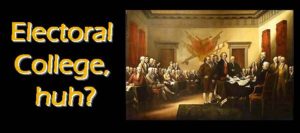Those 538 men and women who are set to meet Monday to elect the next president of the United States are poised to make some serious history, one way or the other.
Most of them come from states that voted for Donald J. Trump, the Republican, over Hillary Rodham Clinton, the Democrat. They comprise the Electoral College, which the nation’s founders established in the 18th century to choose the person who would govern the country.
Here’s the big-time catch: some of them are “faithless,” which means they aren’t necessarily bound by the dictates of their states’ majorities. Add to that some major-league questions about whether Russian intelligence agents and computer hackers influenced the outcome the election and you have a situation of monumental proportions brewing … possibly.
Enough of those electors might decide they can’t vote for Trump and, thus, deny the president-elect the 270 electoral votes he needs to take office in January.
What happens then if, say, not enough of them switch their votes to Clinton, making her the next president? The U.S. House of Representatives, controlled by the GOP, then gets to pick the next president.
I don’t believe this will happen. I believe Trump will collect enough votes from the Electoral College to take the oath on Jan. 20. He will become the 45th president of the United States; Mike Pence will become the vice president.
Trump likely will have the Cabinet chosen by then. The U.S. Senate committees charged with recommending whether these nominees should be confirmed will get to work and make those critical decisions.
But some of the electors have asked to be briefed fully by the U.S. intelligence apparatus on what the Russians did and whether they actually influenced the outcome of the election. Just suppose the spooks tell the electors that, yep, the Russkies succeeded in getting their man elected. What happens then if you’re an elector from a state that voted for Trump and you can’t in good conscience cast your vote for the winner?
Lots of answers yet to come forward before the big day next week.
This could be the most fascinating supposedly pro forma electoral procedure in the history of the Republic.
It could be …
